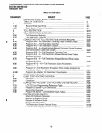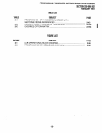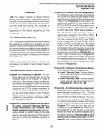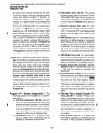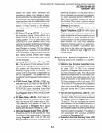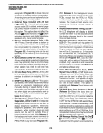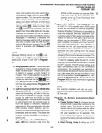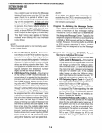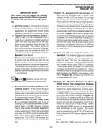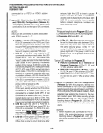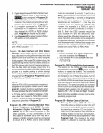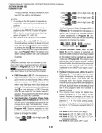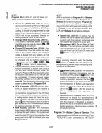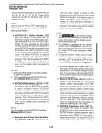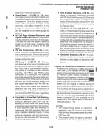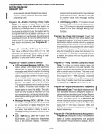
IMPORTANT NOTE:
This option can not always be utilized
because some Central Offices may send
unreliable AR signaling or no AR signal-
ing.
0
0
I
0
AR Time,
Code 4-AR signaling timing is
different depending on the Central Office
equipment. An assignment choice exists
between Crossbar or ESS Central Offices.
Tandem CO Line Connection, Code 5-
Once a two CO line conference call is
made by an electronic or digital telephone
user, that user may drop out of the con-
ference and optionally leave the two CO
lines connected. The choice exists for
each CO line that may have this capability.
This option must be enabled to allow CO
lines to be used for outgoing DISA calls (for
Release
2 and above).
CO Line Tenant Assignment, Code 6-
A system may be effectively split into two
parts in order to serve two tenants using
the same system in a shared arrangement.
This assignment dedicates CO lines to one
tenant or the other. If tenant service is not
desired, leave the assignments all fortenant
1, as initialized.
NOTE:
The m and m buttons control CO ring
modes for tenant 1 and tenant2, respectively.
l
Forced Account Code (verified or non-
verified), Code
7-If the Forced Account
Code feature is used
(see Program 30)
a
station user is required to enter an account
code before aC0 line call can be completed.
A choice exists for each CO line.
l
Operation After CO Line Flash, Code
8-If a standard telephone user is on an
existing CO line call and performs a hook-
switch flash, a DTMF receiver channel
may or may not be connected, depending
on this assignment. If the CO is a rotary dial
only type, the CRCU must be seized after
flash when dialing from DTMF standard
telephones. The CRCU will decode the
dialed tones and send dial pulses to the CO
line.
PROGRAMMINGPROCEDURES-INSTRUCTIONS/SYSTEMRECORDS
SECTION 200-096-302
FEBRUARY1991
Program 16-Assigning CO Line Groups: CO
lines may be accessed with a dialing code
instead of with a CO line button. Up-to ‘eight
groups may be accessed by dialing 81 w 89;
this is useful for WATS lines or other facilities,
and is heavily used in Least Cost Routing and
Pooled Line Key Assignments. Ageneral group
for outside calling is available with a dial 9
access code, which is the initialized state for all
CO lines.
Program 16
is used to assign each
CO line to one of these groups. Do not attempt
to assign a CO line to more than one group. A
CO line need not be assigned to a group. If CO
lines are not used, they should be taken out of
all groups, including the Dial 9 group. ABR will
not function if unconnected lines are assigned
to a line group.
Program 17-TIE Line Page/Handsfree An-
swerback:
The external page and handsfree
answerback features can be optionally acti-
vated for each TIE line. For reference pur-
poses, on the System Record Sheet, enter the
slot number where each PEMU is installed.
This program does not assign TIE lines to slot
numbers; the CO/TIE line number (01 N 36) is
needed for input to this program, but is actually
determined by the PEMU’s slot position in the
KSU.
Program
03 contains the CO/TIE line
number needed for input.
Program 19-Alternate Background Music
(BGM) Source Slot Assignment (Release
3): An alternate BGM source sent to electronic
telephones, digital telephones, and the exter-
nal page output can be connected to a PEKU
or PESU PCB in any universal slot; this Pro-
gram identifies that slot. Identify in
Program 1 O-
2, LED 09 or 10, whether a PEKU or PESU will
be connected to the alternate source (the BGM
source can only be connected to circuit 3 of a
PEKU or circuit 8 of a PESU PCB). When
the alternate BGM source is programmed
and connected to the system, the music
source connected to the PCTU PCB will con-
tinue to be sent to CO lines or stations that are
on-hold.
NOTE:
The alternate BGM source cannot be
2-7



